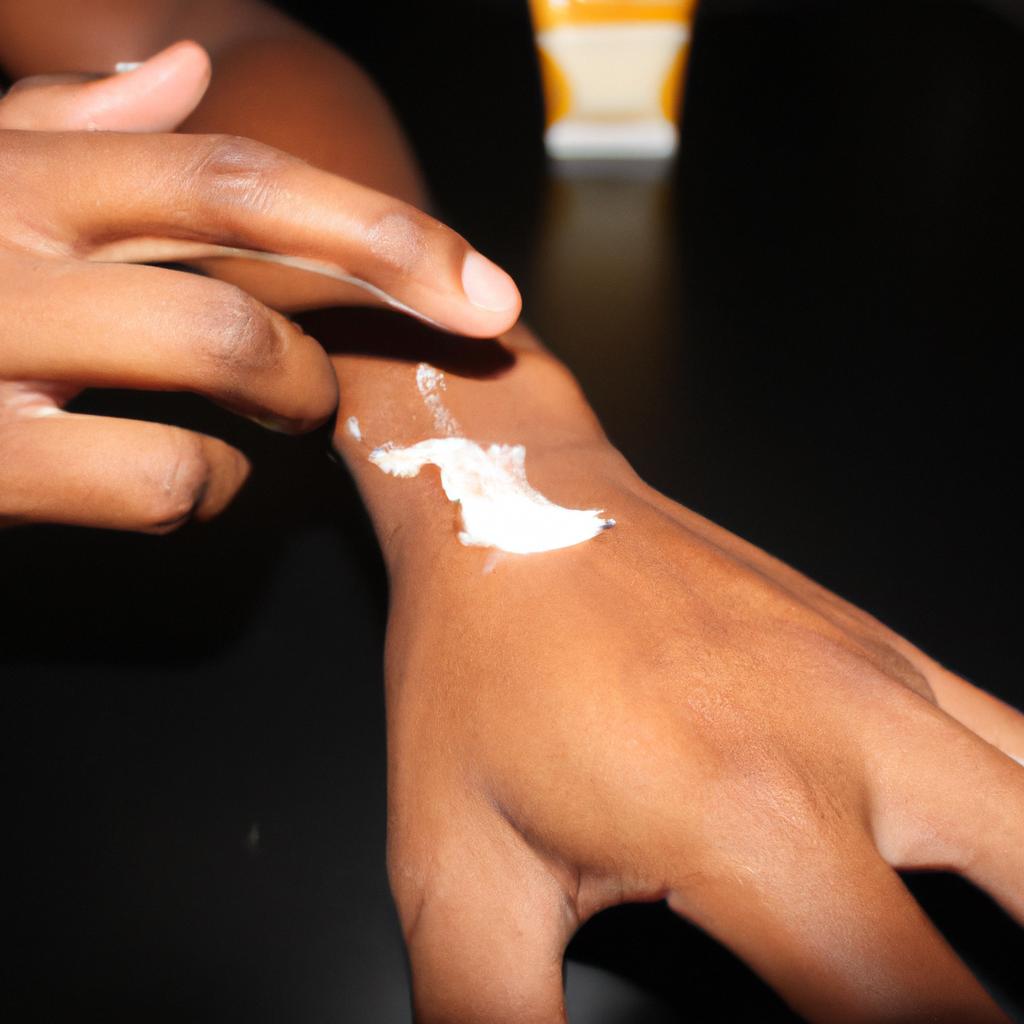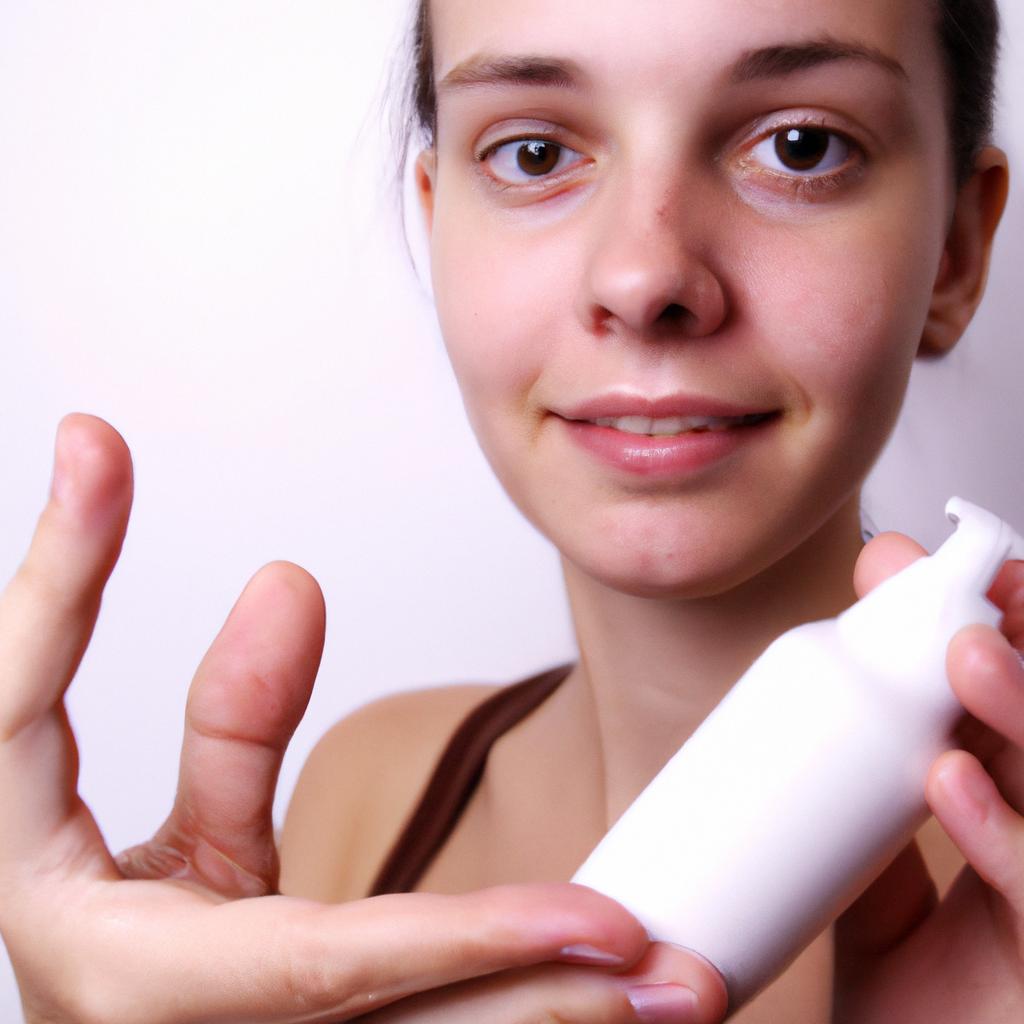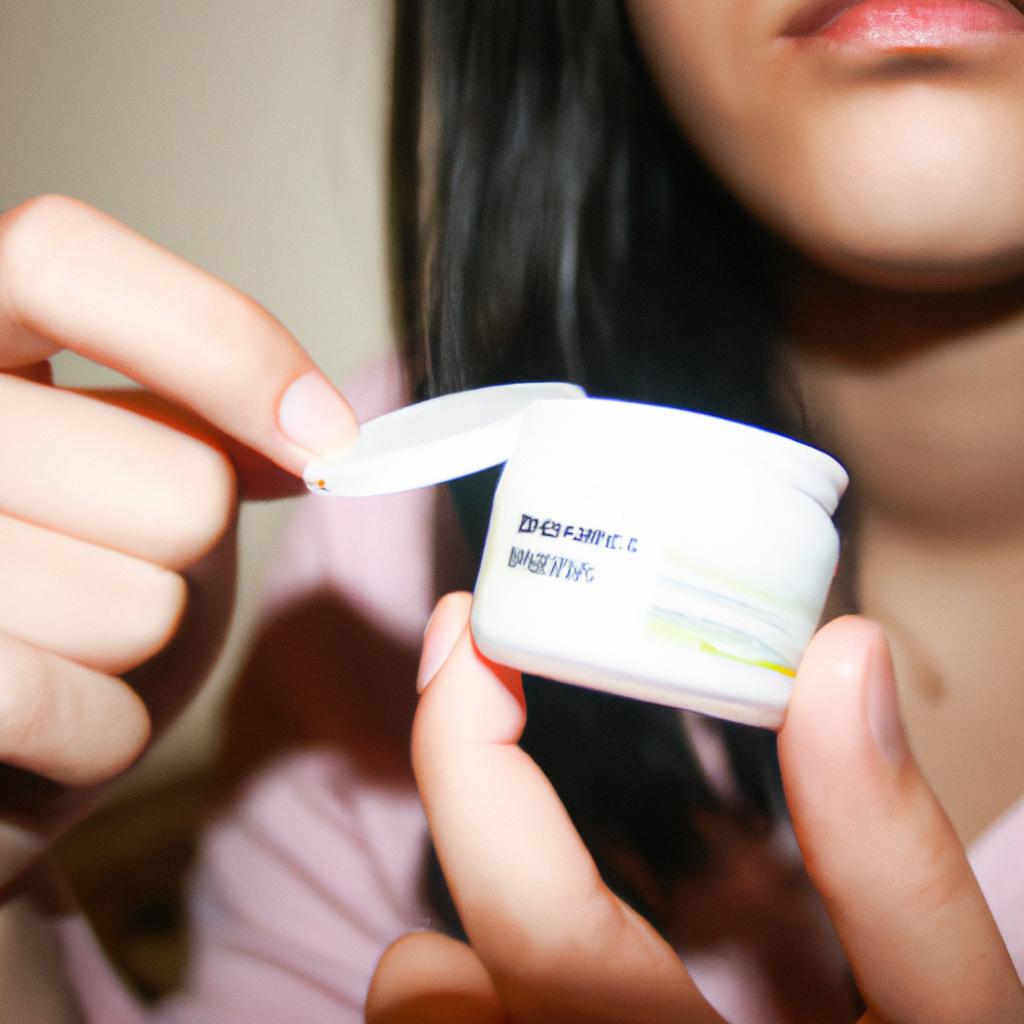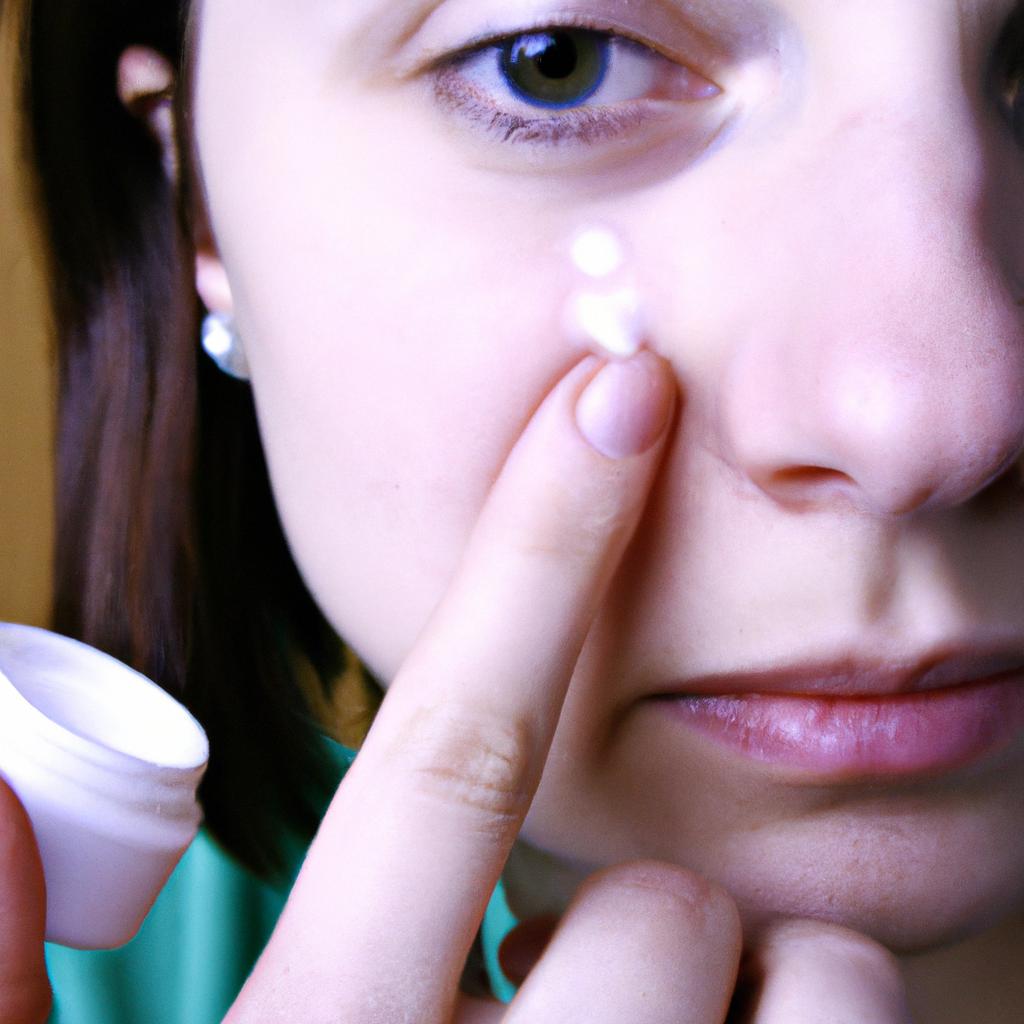Skin care products are an essential part of many individuals’ daily routines, aimed at maintaining healthy and radiant skin. However, it is not uncommon for these seemingly harmless products to cause irritation and adverse reactions on the skin. This article explores the various problems associated with skin care product-induced irritations, examining their prevalence, causes, and potential solutions.
For instance, consider a hypothetical scenario where a middle-aged woman named Sarah purchases a new anti-aging cream from a reputable brand. Excited about its promises of youthful-looking skin, she diligently applies the cream as instructed. To her dismay, within hours, Sarah notices redness, itching, and inflammation on her face. With this case in mind, it becomes evident that even well-known brands can produce products that may trigger unwanted reactions in consumers. Thus, understanding the underlying factors contributing to such irritations is crucial in order to prevent or manage them effectively.
In this article, we will delve into the common ingredients found in skincare products that can potentially lead to irritation. Additionally, we will explore individual susceptibility factors that make some people more prone to developing adverse reactions than others. Finally, we will discuss strategies for identifying and addressing these problems to ensure optimal skin health for all users of skincare products. By shedding light on By shedding light on these issues, individuals can make informed decisions when selecting skincare products and take necessary precautions to minimize the risk of skin irritations. It is important to note that everyone’s skin is unique, and what works for one person may not work for another. Therefore, understanding the ingredients and their potential effects on the skin can help consumers make educated choices.
Common irritants found in skincare products include fragrances, preservatives, and certain active ingredients such as alpha-hydroxy acids (AHAs) or retinoids. These substances can cause allergic reactions or sensitivities in some individuals, leading to symptoms like redness, itching, burning, or even rashes. It is essential to carefully read product labels and avoid those containing known irritants if you have sensitive skin or a history of adverse reactions.
Individual susceptibility factors also play a role in determining who may experience skin irritations from skincare products. Factors such as pre-existing skin conditions (e.g., eczema or rosacea), compromised skin barrier function, or genetic predispositions can increase the likelihood of adverse reactions. Additionally, excessive use of multiple products or improper application techniques can contribute to irritation.
To address these problems effectively, it is recommended to perform patch tests before using new skincare products. This involves applying a small amount of the product on a small area of the skin (typically behind the ear or on the inner forearm) and monitoring for any negative reactions over 24-48 hours. If no irritation occurs during this period, it is generally safe to proceed with using the product as directed.
In case of an adverse reaction after regular use of a skincare product, immediate discontinuation is crucial. Applying cold compresses or soothing creams can help alleviate discomfort and reduce inflammation. Seeking medical advice from a dermatologist is recommended if symptoms persist or worsen.
Furthermore, consulting with a dermatologist before incorporating new products into your skincare routine can provide valuable guidance based on your individual needs and concerns. Dermatologists can recommend suitable products, suggest alternatives for individuals with known sensitivities, or prescribe medications to manage existing skin conditions.
In conclusion, while skincare products are intended to enhance the health and appearance of the skin, they can also cause unwanted irritations in some individuals. By understanding the ingredients, conducting patch tests, and seeking professional guidance if needed, consumers can minimize the risk of adverse reactions and maintain optimal skin health. Remember that everyone’s skin is unique, so it is essential to find products that work well for you individually.
Common Skin Irritants
Imagine waking up one morning with red, itchy patches on your face. You try to recall any recent changes in your skincare routine but draw a blank. This scenario is all too familiar for individuals who have fallen victim to common skin irritants. These substances can wreak havoc on our delicate skin, leading to discomfort and frustration. In this section, we will explore some of the most prevalent irritants that plague our skin daily.
Skin Irritation: A Widespread Problem
The world around us is filled with potential triggers for skin irritation. From personal care products to environmental factors, numerous culprits can disrupt our skin’s natural harmony. Some of the most common irritants include:
- Fragrances: Synthetic scents found in perfumes, lotions, and even household products can cause allergic reactions and dermatitis.
- Harsh Cleansers: Aggressive cleansing agents like sulfates strip away the protective oils from our skin, leaving it dry and vulnerable.
- Allergens: Substances such as pollen, mold spores, and pet dander can trigger allergic reactions in susceptible individuals.
- Chemicals: Certain chemicals used in cosmetics or cleaning products may be abrasive or toxic to the skin.
Table – Common Skin Irritants:
| Irritant | Examples |
|---|---|
| Fragrances | Perfumes, lotions |
| Harsh Cleansers | Sulfate-based soaps |
| Allergens | Pollen, mold spores |
| Chemicals | Cosmetics, cleaning agents |
Consequences of Skin Irritation
Exposure to these irritants has various consequences for our skin health and overall well-being. The effects range from mild discomfort to severe allergic reactions. Some possible outcomes include:
- Redness and itching: Skin exposed to irritants often becomes inflamed, resulting in noticeable redness and persistent itching.
- Dryness and flakiness: Harsh cleansers and certain chemicals can strip the skin of its natural oils, leading to dryness and peeling.
- Allergic reactions: For individuals with allergies or sensitivities, exposure to irritants may trigger allergic dermatitis characterized by swelling, blisters, or hives.
- Exacerbation of existing conditions: Irritants can worsen pre-existing skin conditions like eczema or psoriasis, causing flare-ups and prolonged discomfort.
Understanding these common irritants is crucial in identifying potential triggers for skin irritation. In the following section, we will delve into the signs that indicate our skin may be experiencing a reaction to these substances.
Signs of Skin Irritation
Skin irritation is a common problem that many individuals experience due to various factors. In the previous section, we discussed some of the most common irritants that can negatively affect the skin’s health. Now, let us delve deeper into the signs of skin irritation and how they manifest.
To illustrate this point, consider the hypothetical case of Sarah, who recently started using a new face cream. After applying it for several days, she noticed her skin becoming red, itchy, and dry. These are classic signs of skin irritation caused by an allergen or irritant in the product. This example highlights the importance of understanding these signs so that prompt action can be taken to alleviate discomfort and prevent further damage.
When it comes to recognizing skin irritation, there are key indicators to look out for:
- Redness: The affected area may appear redder than usual or have patches of intense redness.
- Itching: A persistent itchiness on the irritated area often accompanies skin irritation.
- Dryness: Your skin might feel rough, flaky, or excessively dry in specific regions.
- Swelling: Some cases may involve slight swelling or puffiness around the affected site.
These signs serve as crucial warning signals from your body that something is amiss with your skincare routine. By paying close attention to them, you can take proactive steps towards resolving any underlying issues and preventing further harm.
Consider the following table which summarizes common causes of skin irritation:
| Cause | Example | Symptoms |
|---|---|---|
| Allergens | Pollen | Rash, itching |
| Harsh chemicals | Sodium lauryl sulfate | Burning sensation |
| Environmental factors | Sun exposure | Redness, sunburn |
| Friction | Ill-fitting shoes | Blisters, chafing |
Understanding the causes and signs of skin irritation is crucial for effective skincare. In the subsequent section, we will further explore the various factors that can lead to skin irritation, offering insights into how you can avoid or mitigate them. By gaining a comprehensive understanding of these causes, you can take proactive measures to protect your skin’s health and maintain its natural radiance.
Next section H2:’Causes of Skin Irritation’
Causes of Skin Irritation
Skin irritation can manifest in various ways, indicating a potential problem with skincare products. For instance, let’s consider the case of Sarah, a 35-year-old woman who recently started using a new moisturizer. Within a week of application, she noticed redness and itching on her face—an unmistakable sign of skin irritation. This example highlights the importance of recognizing these signs early on to address any issues promptly.
When it comes to identifying skin irritation, there are several key indicators to be aware of:
-
Redness and inflammation: One common sign is the appearance of red patches or blotchy areas on the skin. The affected area may also feel warm to the touch due to increased blood flow as part of an inflammatory response.
-
Itching and discomfort: Persistent itchiness can indicate that your skin is reacting negatively to certain ingredients in a product. This sensation may cause significant discomfort and lead to scratching, further aggravating the irritated area.
-
Dryness and flakiness: Skin irritation often results in dryness and flaking, making the affected area appear rough and dehydrated. These symptoms typically occur when the natural moisture barrier is disrupted by irritants present in skincare products.
-
Formation of rashes or hives: In some cases, repeated exposure to allergens or irritating substances triggers an immune response that manifests as raised bumps (rashes) or welts (hives). These reactions may vary in severity from mild to severe depending on individual sensitivity levels.
- Frustration: Dealing with persistent discomfort can be mentally draining.
- Self-consciousness: Visible signs like redness or rashes might affect self-esteem.
- Disruption of daily routine: Constant itching or pain can hinder productivity and quality of life.
- Financial implications: Seeking medical help or trying various products can incur additional costs.
Additionally, we present a table summarizing the signs of skin irritation and their potential causes:
| Sign | Potential Causes |
|---|---|
| Redness | Allergic reactions |
| Itching | Irritating ingredients |
| Dryness | Disruption of moisture barrier |
| Rashes/Hives | Sensitivity to specific substances |
In conclusion, being able to identify common signs of skin irritation is essential for effectively addressing any skincare product problems. Recognizing symptoms like redness, itching, dryness, and rashes allows individuals to take appropriate actions promptly.
Preventing Skin Irritation
Skin irritation can be a bothersome condition that many people experience due to various causes. To avoid these discomforts, it is important to take preventive measures and adopt healthy skincare practices. By understanding the causes of skin irritation and implementing preventative strategies, individuals can maintain healthier skin and reduce the likelihood of experiencing further problems.
One example that highlights the significance of prevention is Sarah’s case. Sarah had been using a particular brand of moisturizer for months without any issues until she suddenly developed redness and itchiness on her face. After consulting with a dermatologist, she discovered that one of the ingredients in the moisturizer was triggering an allergic reaction. This situation could have been avoided if Sarah had practiced preventive measures by carefully reading product labels or conducting patch tests before incorporating new skincare products into her routine.
To prevent skin irritation effectively, consider the following guidelines:
- Choose gentle skincare products formulated for your specific skin type.
- Read product labels and avoid ingredients known to cause irritation or allergies.
- Conduct patch tests on a small area of your skin before applying new products all over your face or body.
- Keep your skin clean and moisturized while avoiding excessive use of harsh cleansers or exfoliants.
Implementing these precautions helps minimize the risk of developing skin irritations caused by allergens or irritants commonly found in cosmetics and personal care items.
| Choose gentle skincare products | |
|---|---|
| Benefits | Reduce sensitivity |
| Nourish and protect | |
| Minimize potential irritants |
By opting for gentler options, you not only decrease the chances of adverse reactions but also provide nourishment and protection to your skin.
In conclusion, preventing skin irritation involves making informed choices about skincare products while adopting good hygiene habits. Understanding what triggers irritation allows individuals to select suitable formulations tailored to their specific needs. Furthermore, practicing caution when introducing new products and ingredients into your routine can help mitigate potential risks. By following these guidelines, individuals can take proactive steps towards maintaining healthy skin.
With a solid understanding of how to prevent skin irritation, it is essential to explore effective methods for treating this condition when it does occur.
Treating Skin Irritation
Transitioning from the previous section on preventing skin irritation, it is important to address how to effectively treat any skin irritations that may arise. Understanding the appropriate measures for treating such issues can help alleviate discomfort and promote a speedy recovery.
To illustrate this point, let us consider a hypothetical scenario involving Sarah, who experienced skin irritation after using a new face cream. In order to address these symptoms and restore her skin’s health, Sarah sought out suitable treatment options.
When faced with skin irritation concerns, individuals should keep in mind several key strategies:
-
Seeking medical advice: If the symptoms persist or worsen despite home remedies or over-the-counter treatments, it is crucial to consult a healthcare professional. Medical experts possess the knowledge and experience necessary to diagnose underlying causes of irritation and recommend appropriate interventions.
-
Utilizing soothing topical products: Applying gentle moisturizers or creams specifically formulated for sensitive skin can provide relief. Look for products containing ingredients like aloe vera or oatmeal extracts known for their calming properties.
-
Avoiding further irritants: It is essential to identify and eliminate potential triggers that may exacerbate existing skin irritation. This includes refraining from using harsh soaps, fragrances, or other skincare products that could potentially aggravate sensitivity.
-
Practicing good skincare hygiene: Maintaining proper skincare routines by cleansing gently with mild cleansers and patting dry instead of rubbing can prevent additional harm to already irritated areas of the skin.
Consider the emotional impact of dealing with ongoing skin irritation through analyzing this table showcasing common feelings associated with persistent irritations:
| Emotion | Description |
|---|---|
| Frustration | Feeling annoyed or aggravated |
| Discomfort | Sensation of physical unease |
| Self-conscious | Concerned about appearance |
| Anxiety | Worry or unease |
In conclusion, treating skin irritation requires a comprehensive approach that involves seeking medical advice if necessary, utilizing soothing topical products, avoiding further irritants, and practicing good skincare hygiene. By following these strategies, individuals can effectively address their skin concerns and work towards restoring the health of their irritated skin.
Transitioning to the subsequent section on natural remedies for skin irritation, it is important to explore alternative options that may provide relief without relying solely on conventional treatments.
Natural Remedies for Skin Irritation
Transitioning from the previous section on treating skin irritation, it is important to explore various treatment options that can help alleviate discomfort and promote healing. Let’s consider a case study where an individual experienced skin irritation after using a particular skincare product. This example will serve as a starting point to discuss different approaches in managing such issues effectively.
In this case study, Lisa developed redness and itching on her face shortly after applying a new moisturizer. To address her condition, she sought out different treatment options recommended by dermatologists and skincare experts:
-
Identify the irritant: It is crucial to pinpoint the specific ingredient or component causing the irritation. By carefully examining the product label and seeking professional advice, individuals can avoid similar ingredients in future products.
-
Soothing topical treatments: Applying cool compresses or utilizing over-the-counter hydrocortisone creams can provide temporary relief from symptoms like inflammation, redness, and itchiness.
-
Moisturizing with care: Opting for gentle, fragrance-free moisturizers without harsh chemicals can help restore hydration to irritated skin while minimizing further aggravation.
-
Seek medical intervention if necessary: If symptoms persist or worsen despite home remedies, consulting a dermatologist is advisable. They may prescribe stronger topical medications or recommend additional treatments tailored to one’s specific needs.
To further understand potential causes of skin irritation related to skincare products, let us examine the following table illustrating common irritants found in cosmetics:
| Common Irritants | Possible Effects | Examples |
|---|---|---|
| Fragrances | Allergic reactions (rashes, hives) | Perfumes, scented lotions |
| Parabens | Contact dermatitis | Preservatives in makeup and beauty products |
| Sodium Lauryl Sulfate | Dryness and flaking | Foaming agents in cleansers and shampoos |
| Formaldehyde | Skin irritation, allergic reactions | Found in nail polishes and hair straightening products |
By being aware of these potential irritants, individuals can make informed choices when selecting skincare products and minimize the risk of skin irritation.
In summary, treating skin irritation involves various approaches tailored to an individual’s specific needs. By identifying the irritant, utilizing soothing topical treatments, moisturizing with care, and seeking medical intervention if necessary, sufferers like Lisa can find relief from discomfort caused by skincare product problems. Understanding common irritants found in cosmetics also helps consumers make educated decisions about the products they use regularly.
 Stanley Beauty Care
Stanley Beauty Care



